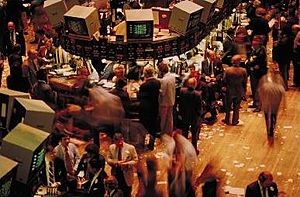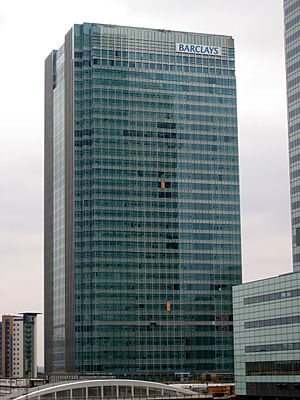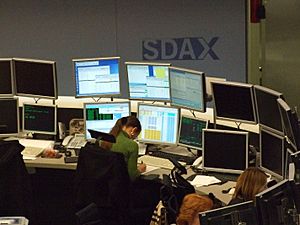Capital market facts for kids

A capital market is a special place where people and companies can buy and sell things that help businesses and governments get money for a long time. Think of it as a big marketplace for long-term investments. This is different from a money market, which is for short-term money needs. Capital markets help connect people who have extra money (savers) with those who need money for big, long-term projects, like building new factories or roads.
Important groups like the U.S. Securities and Exchange Commission (SEC) watch over these markets. They make sure everything is fair and that investors are protected from scams.
Most of the time, big banks or government departments handle these deals. But sometimes, regular people can also join in. For example, in the United States, anyone with internet can use a website called TreasuryDirect to buy government bonds. Many private companies also have websites where you can buy shares in companies. These systems are all over the world, especially in big financial centres like London, New York, and Hong Kong.
Contents
What are Capital Markets?
A capital market can be one of two types: a primary market or a secondary market.
Primary and Secondary Markets
In a primary market, new shares or bonds are sold for the very first time. Imagine a company selling its shares to the public for the first time – that happens in the primary market. Governments also sell new bonds here to raise money. Big investors like pension funds (which manage retirement money) and hedge funds (which make big investments) often buy these new shares or bonds.
In a secondary market, shares or bonds that have already been sold once are bought and sold again between investors. This is like buying a used video game – it's not new, but it's still being traded. Most of the trading you hear about, like on the stock exchange, happens in the secondary market. The secondary market is important because it makes investors more willing to buy new shares or bonds. They know they can easily sell them later if they need their money back.
Stock Markets vs. Bond Markets
There are two main parts of capital markets:
- The stock market is where you buy and sell shares. When you buy shares, you become a small owner of a company.
- The bond market is where you buy and sell bonds. When you buy a bond, you are lending money to a company or government, and they promise to pay you back with interest.
Capital Markets vs. Money Markets
The money market is for short-term money needs, sometimes for loans that are paid back in just a day or two. Companies might use money markets to get quick cash for daily bills.
The capital markets are for long-term money needs. This means buying shares or getting loans that won't be paid back for at least a year. Companies use money from capital markets to invest in big things like new buildings or machines that will help them grow over many years.
Together, money markets and capital markets make up the financial markets. Capital markets are all about getting money for the long haul. They help connect the savings of a community with businesses and governments that need to invest and grow.
Capital Markets vs. Bank Loans
Regular bank lending is usually not considered a capital market deal. Here's why:
- Bank loans are not usually "securitized." This means they aren't turned into something like a share or bond that can be easily traded on a market.
- Banks are more heavily regulated than capital markets.
- People who put money in banks usually want less risk than those who invest in capital markets.
Banks are often easier for smaller companies to get loans from. For a long time, most companies got their money from banks. But since the 1980s, many large companies have found it cheaper to borrow money directly from capital markets instead of from banks. This is because they can often pay less interest. After the 2007–2012 global financial crisis, capital markets became the main way for companies to get long-term money.
In places like the European Union, companies still rely more on bank loans than in the United States.
Examples of Capital Markets in Action
Governments Raising Money

When a government needs money for a long time, it often sells bonds in the capital markets. In the past, governments would hire big investment banks to help them sell these bonds. These banks would find investors to buy the bonds.
Today, many larger governments sell their bonds directly online through computer auctions. They often sell huge amounts at once. The U.S. government, for example, sells debt almost constantly, with sales happening every second!
Companies Raising Money
When a company wants money for a big, long-term investment, it has to decide whether to sell bonds or shares.
- If a company sells shares, it doesn't go into debt. New shareholders might even offer helpful advice. However, selling new shares means the original owners own a smaller part of the company.
- If a company sells bonds, it takes on debt. But bonds are generally safer for investors if the company doesn't do well. Bond owners are usually paid back before shareholders if a company goes bankrupt.
When a company raises money in the primary market, they usually work with an investment bank. The bank helps make sure the company's plans are good. Then, the bank helps sell the shares or bonds to investors, often using computer systems and by calling their best clients. Companies can try to sell shares directly to the public to save on bank fees, but this can be complicated and take a lot of time.
Trading in the Secondary Market

Most capital market deals happen in the secondary market. A share or bond can only be sold once in the primary market, but it can be traded many times in the secondary market. These trades are usually very fast.
Even though secondary market trades don't directly raise new money for companies, they are very important. They make it easier for companies and governments to raise money in the primary market. Investors know they can easily sell their shares or bonds if they need their money back quickly.
Many different types of people and groups trade in the secondary markets:
- Individual investors (like you, if you were old enough!) can buy and sell using online platforms provided by brokers.
- Traders at investment banks buy and sell for their bank and for their clients.
- Pension funds and sovereign wealth funds (which manage money for countries) hold huge amounts of shares and bonds. They usually buy the safest types.
- Hedge funds often make many short-term trades.
You can also invest in the secondary market without directly buying shares or bonds. Many people invest in mutual funds or exchange-traded funds. These are like big baskets of different shares or bonds managed by experts.
How Big are Capital Markets?
Here's a look at how big capital markets are, in billions of US dollars. These numbers can vary a bit depending on how they are measured. The "World GDP" column shows the total value of all goods and services produced in the world for comparison.
| Year | Stocks | Bonds | Bank assets | Total of stocks, bonds and bank assets |
World GDP |
|---|---|---|---|---|---|
| 2013 | 62,552.00 | 99,788.80 | 120,421.60 | 282,762.40 | 74,699.30 |
| 2012 | 52,494.90 | 99,134.20 | 116,956.10 | 268,585.20 | 72,216.40 |
| 2011 | 47,089.23 | 98,388.10 | 110,378.24 | 255,855.57 | 69,899.22 |
Capital Controls
Sometimes, a government might put in place "capital controls." These are rules that manage how money flows in and out of a country through capital markets. Governments use these controls to try and keep their economy stable.
For example, if too much money suddenly leaves a country, it can cause problems. Or, if too much money flows in, it can make prices go up. Countries like India use capital controls to encourage their citizens to invest money at home.
See also
 In Spanish: Mercado de capitales para niños
In Spanish: Mercado de capitales para niños
- Bank
- Financial market
- Financial regulation
- Stock exchange
- Capital Markets Union

